Nam Hao has attracted a lot of attention on Chinese social media. The high school boy often shares simple stories about his daily life. Many people are attracted by Nam Hao's mature and understanding way of thinking.
Many parents even said they regularly follow Nam Hao's social media accounts to... raise their children better. Why is the teenager Vuong Nam Hao so famous?
Below are some of the contents posted by Nam Hao and loved and spread by the Chinese online community.
Why don't you love learning?

Nam Hao believes that many students do not hate studying, it is simply that they do not have enough experience (Illustration: Freepik).
Many parents often ask their children: "Why don't you like studying? Studying well will bring you a good life in the future, why don't you study properly?" According to the teenager, many students don't like studying because they don't have enough practical experience.
Nam Hao cited his own story as evidence. The teenager had never traveled abroad until his older brother earned money and took his younger brother along. Only then did he truly “explode” about the importance of learning a foreign language.
Before, learning English was quite boring for Nam Hao, he thought grammar and vocabulary were dry. But the experience of going abroad, seeing his brother using English to order food, buy things, communicate... makes Nam Hao have a different perspective. From then on, he naturally loved learning English.
Before that, his parents and teachers had always emphasized to him that learning a foreign language was very important, but those reminders were still not as effective as a real-life experience when going with his brother.
The teenager concluded in a video posted on social media: “Many of you don't hate studying, it's just that you don't have enough experience, you haven't seen the big world , so you don't feel the true meaning of studying. In fact, studying will help you step out into the world with confidence.”
Should we blame our children when they like to buy branded goods?

Nam Hao thinks that knowing how to save money to buy the things you like is also commendable (Illustration: Freepik).
Many parents believe that if their children like to buy expensive things, they are showing off and spoiled. A friend of Nam Hao was once severely scolded by his parents for buying a pair of sneakers costing more than 1,000 yuan (more than 3.6 million VND) with his personal savings.
What is blameworthy about this teenager is that he did not discuss the decision to buy expensive shoes with his parents before. But in reality, Nam Hao's friend saved every penny, did not drink milk tea, and did not deposit money to play games. Nam Hao thinks that his friend's parents scolding their son heavily for "following the trend" is a bit excessive.
"On the other hand, I see in my friend a very good ability to control himself. He persistently pursues his goals and is not swayed by "temptations", so he deserves to have what he has long desired. Although giving advice to his child, his parents should also acknowledge his perseverance and ability to control himself," Nam Hao said.
Parents need to ask themselves why their children are constantly bullied.

The problem of school bullying is directly related to the way parents share with their children (Illustration: Freepik).
Nam Hao shared two stories. One of his classmates was skinny and shy, and was often teased by his classmates, sometimes to the point of going too far. His mother went to the school and met with the teacher to report the problem. Since then, his classmates have not teased him too much.
On the contrary, another overweight friend was also teased, but his parents did not report anything to the teacher. Things just went on and on, the “fat” friend sometimes felt frustrated and miserable but could only “bear it”.
Nam Hao commented that even among classmates, there is a distinction between strong and weak. Good students are often cared for and supported by teachers; or those who are "children of good conditions" are always carefully taken care of by their parents, and are rarely bullied. Meanwhile, those who are gentle, quiet, not outstanding, and somewhat quiet, are more likely to become victims of bullying.
Parents often mistakenly believe that their children are doing well at school, so they fail to anticipate all the problems. Nam Hao believes that preventing school violence requires parents to really follow up, understand their children, make them trust and share, and most importantly, parents must dare to stand up for their children.
I'm not lazy to study, I'm just still being controlled by instinct.

Nam Hao believes that studying hard is hardly something that comes naturally (Illustration: Freepik).
Many parents often humorously compare teaching their children to a “calamity”. While parents are always short of time, they still try to study with their children, but as soon as their children sit down at the desk, they are absent-minded, lose focus, scratch their heads, click their pens, play with their erasers...
Regarding this, Nam Hao analyzed very thoroughly: "Parents themselves were like that. When they were young, everyone was easily distracted, lost focus, loved to play, and was lazy to study. Even adults, when faced with a large amount of work, coming at them at once, easily fall into procrastination and avoidance, let alone children?"
Nam Hao believes that studying hard is hardly something that comes naturally to one's instincts. Adults have better control, but children need to be patiently taught how to overcome their instincts and gradually learn to control themselves when sitting at their desks.
According to the young man Nam Hao, instead of constantly scolding their children, parents should understand that their children are not lazy, but are just being carried away by their instincts. What parents need to do is guide and help their children find joy in learning.
If you want to understand your child, look from his eyes.

Nam Hao emphasizes that parents need to understand and interact with their children based on their vision and way of thinking (Illustration: Freepik).
Nam Hao still remembers when he was little, his mother once took him to visit a fair, but he kept asking to go home. His mother shouted: “I spent time taking you out, why do you keep acting so upset?” He replied: "What's so fun about that? I only see human legs."
At this moment, his mother was surprised to realize that, from his height, it was difficult for him to observe all the interesting things at the fair, all he could see were... legs.
Or when his parents taught him his first math problems, they only expected Nam Hao to give the correct answer, while he only paid attention to the funny drawings illustrating the math problems.
Nam Hao believes that to truly accompany their children through each stage, parents must understand and interact with their children based on their vision and way of thinking in each specific stage.
“Children see the world from a completely different perspective than adults. If parents do not change their perspective when interacting with their children, they will never be able to understand them,” Nam Hao said in another video.
What to do when your child is too obsessed with idols?

Parents can turn their children's interests into strong motivations, helping them progress (Illustration: Freepik).
Nam Hao has a friend who loves a Korean band. Her parents do not forbid her but encourage her to learn Korean. In addition, her parents also set a condition: If she wants to go to her idol's concert in Korea, she must achieve good academic results.
The girl studied hard and improved her grades significantly. Her parents kept their promise and took her to Korea to see the concert she had been waiting for, but with a condition: She had to plan the entire trip herself.
From applying for a visa, booking flights, booking hotels, and making schedules, the child had to research and do everything on her own in the fan community. During the days the family stayed in Korea, the female student became the real “group leader” of the family. That journey helped her develop her language skills, organizational skills, and sense of responsibility.
Nam Hao really admires the way his friend's parents behaved: "They turned their child's interests into a strong motivation, helping him progress in the direction they expected."
In the end, Nam Hao concludes that family education is not about making children always fear their parents, forcing them to obey, or training them to become learning machines. Education is when one soul awakens another soul. Only when parents bend down, are on the same level as their children, and see life from their children's perspective, can parents truly accompany their children.
According to Weixin
Source: https://dantri.com.vn/Giao-duc/ong-cu-non-khien-cac-bac-phu-huynh-cap-sach-but-theo-hoc-20250701095945827.htm



![[Photo] Prime Minister Pham Minh Chinh receives leaders of several leading Brazilian corporations](https://vphoto.vietnam.vn/thumb/1200x675/vietnam/resource/IMAGE/2025/7/6/3622160b379746e6bca82f804ea35e47)
















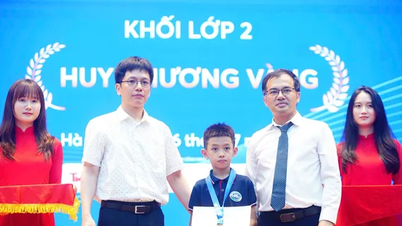



















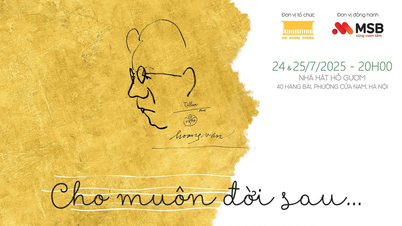





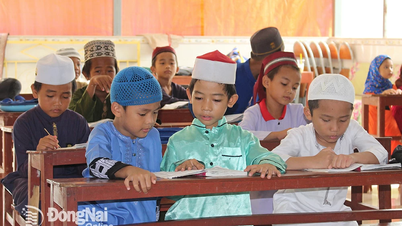



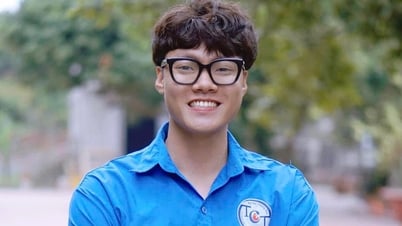




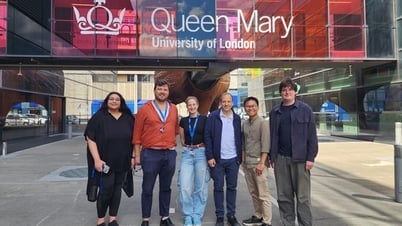












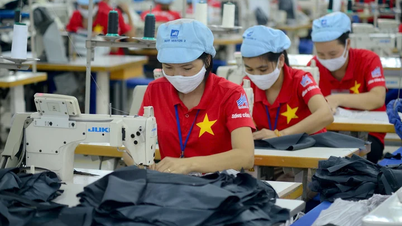






















![[OCOP REVIEW] Bay Quyen sticky rice cake: A hometown specialty that has reached new heights thanks to its brand reputation](https://vphoto.vietnam.vn/thumb/402x226/vietnam/resource/IMAGE/2025/7/3/1a7e35c028bf46199ee1ec6b3ba0069e)










Comment (0)